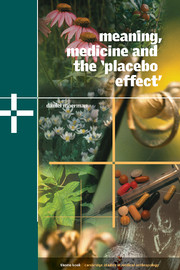Book contents
- Frontmatter
- Contents
- List of figures
- List of tables
- Acknowledgements
- Introduction: “Pickle ash” and “high blood”
- Part I The meaning response
- Part II Applications, challenges, and opportunities
- Part III Meaning and human biology
- 12 The extent (and limits) of meaning
- 13 Conclusions: many claims, many issues
- References
- Index
12 - The extent (and limits) of meaning
Published online by Cambridge University Press: 05 June 2012
- Frontmatter
- Contents
- List of figures
- List of tables
- Acknowledgements
- Introduction: “Pickle ash” and “high blood”
- Part I The meaning response
- Part II Applications, challenges, and opportunities
- Part III Meaning and human biology
- 12 The extent (and limits) of meaning
- 13 Conclusions: many claims, many issues
- References
- Index
Summary
It is clear that what I refer to as the meaning response is far larger and more significant than what happens when people take placebos. Figure 12.1 shows a representation of the relationship between the two situations; they overlap in an important way. Both the placebo effect and the meaning response involve more than simply the reactions of people to inert medications. People taking placebos in an RCT may exhibit regression to the mean (or movement to homeostasis), or bias, or more. Similarly, the physiological or psychological response to meaning - the meaning response - occurs in many more areas than clinical trials.
Sightings
Other authors have extended this net even further than I have. Harvard historian Anne Harrington has described what she calls “sightings, … fauna that live in the same larger territory of human psychobiological functioning in which the placebo effect makes its home as well” (Harrington in press). Among her sightings are these:
“A room with a view.” A study at a suburban Pennsylvanian hospital showed that surgical patients who stayed in a room with a window view of a natural setting got better faster than a matched sample of patients who had a view of a brick wall (Ulrich 1984).
“Psychosocial dwarfism.” A number of studies in the US and Europe have shown that children deprived of a secure bond with a loving caretaker - children in orphanages or abusive situations (even those whose material needs are met) - may grow up physically stunted. They have been shown to have reduced levels of growth hormones. Simply removing them from the situation and providing them with a loving secure home (probably involving people who will talk with them, that is, make life meaningful) can be sufficient to reverse the damage (Mouridsen and Nielsen 1990).
[…]
- Type
- Chapter
- Information
- Meaning, Medicine and the 'Placebo Effect' , pp. 133 - 146Publisher: Cambridge University PressPrint publication year: 2002



